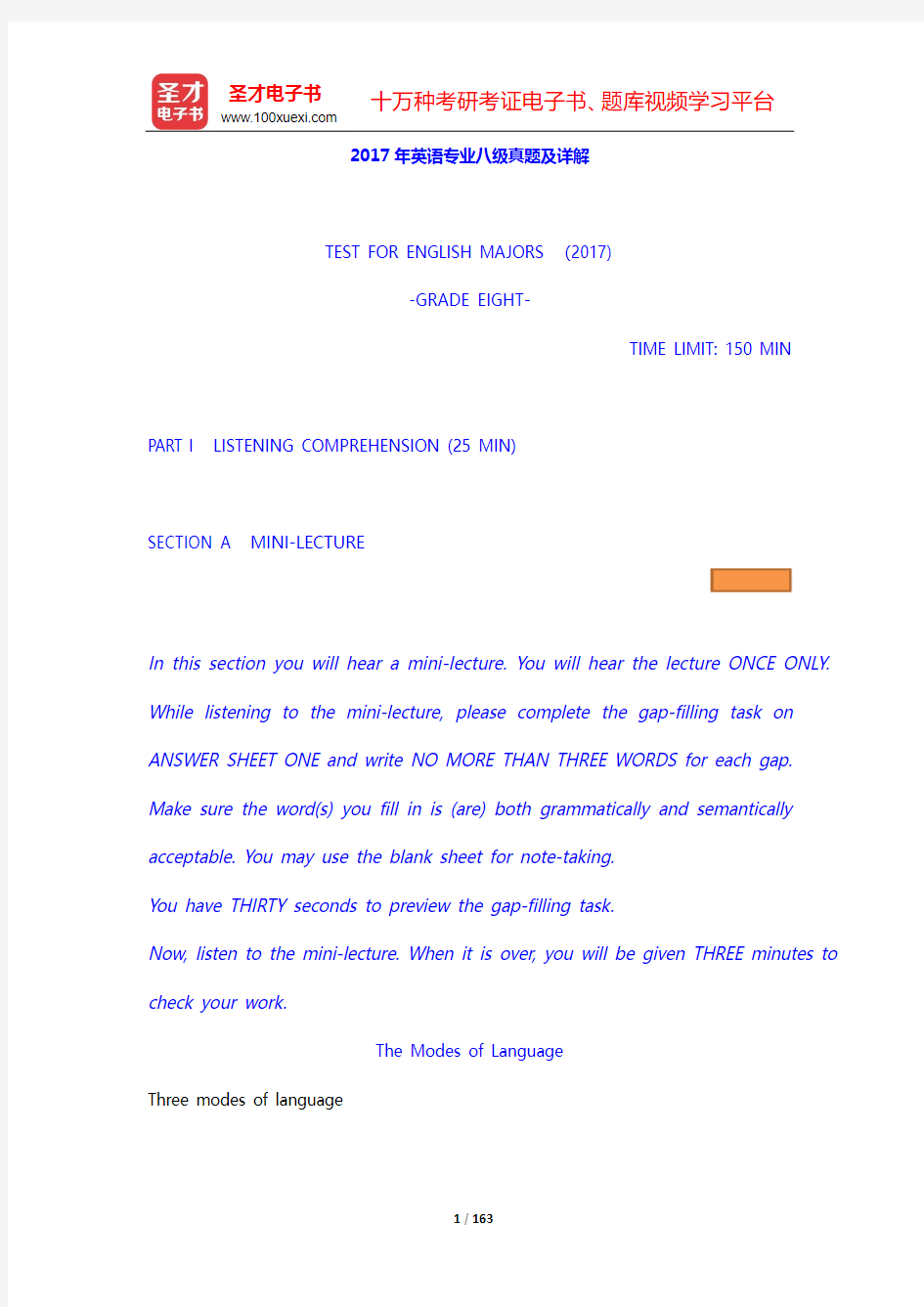

2017年英语专业八级真题及详解
TEST FOR ENGLISH MAJORS (2017)
-GRADE EIGHT-
TIME LIMIT: 150 MIN PART I LISTENING COMPREHENSION (25 MIN)
SECTION A MINI-LECTURE
In this section you will hear a mini-lecture. You will hear the lecture ONCE ONLY. While listening to the mini-lecture, please complete the gap-filling task on ANSWER SHEET ONE and write NO MORE THAN THREE WORDS for each gap. Make sure the word(s) you fill in is (are) both grammatically and semantically acceptable. You may use the blank sheet for note-taking.
You have THIRTY seconds to preview the gap-filling task.
Now, listen to the mini-lecture. When it is over, you will be given THREE minutes to check your work.
The Modes of Language
Three modes of language
【答案与解析】
(1) signing
细节题。录音中提到“the third model is called signing”。所以除了speech与writing 的第三种模式就是signing。(2) primary
细节题。录音中提到it is commonly noted that speech is primary and writing secondary。因此speech对应的是primary。
(3) to become literate/literacy
细节题。录音中提到“to become literate a child will need some kind of formal schooling in reading and writing”。因此,可用原词to become literate作答.也可
用literate的名词形式literacy“读写能力”。
(4) different but complementary
细节题。录音中提到“it is more accurate to view the two modes as having different but complementary roles”,因此二者关系为“different but complementary”。(5) not involving recollection/avoiding recollection
细节分析题。本题主要说明书面合同的好处。录音中提到书面合同与口头协议的对比“Disputes over an oral contract will involve one person’s recollection of the contract versus another person’s”,意为书面合同在有纠纷时可查阅和作解读。而“involve one person’s recollection of…versus another person’s”表示口头协议的纠纷会涉及个人的记忆问题,这是书面合同可避免的,故可选用原词not involving recollection 作答,或换用近义的avoiding recollection。
(6) (many) social contexts
细节题。录音中提到“this mode is well suited to many social contexts”。讲座中提到well suited指“合适的”,与空格前的appropriate意思是一致的。因此答案为(many) social contexts。
(7) characteristics/features
总结题。根据空格下方所列出的内容,以及文章中提到的“As two different modes of language, speech and writing, have their own characteristics.”,可以归纳出这一段表达的是口语与书面语的特点。因此可选用文章中提到的“characteristics”或者同义词“features”。
(8) reaction
细节题。录音中提到“speakers are face to face and can therefore see how
individuals react to what is said”,空格处填入的词由形容词visible修饰,应填入名词,故可选用react的名词形式reaction。
(9) distance
细节题。录音中提到“writing creates distance between writer and reader”,故本题填distance即可。
(10) emphasis and emotion
细节题。录音中提到“Speech is oral, thus making it possible to use intonation to emphasize words or phrases and e xpress emotion”,这句强调音调(intonation) 的两个作用,一是强调,二是表达情感。因此本空需将两项答案合并。可将动词emphasize换成名词emphasis,而emotion则可照用原词。
(11) deliberate
细节题。录音中提到“On the contrary, writing is much more deliberate.”。讲座对比了两者的随意性,其中提到writing与speech相反,更具刻意性(much more deliberate) ,故答案用deliberate即可。
(12) intimacy and immediacy
细节题。录音中提到“they still lack the intimacy and immediacy of a face-to-face conversation.”,故答案为intimacy and immediacy。
(13) continuum
细节题。录音中提到“it is important for us to note that there is a continuum between speech and writing”,故答案为continuum。
(14) discourses and texts
分析题。文中提到“various linguistic markers of interactive discourse ...... than
many of the spoken texts.”,讲座分述语言学标记(1inguistic markers) 在口语和书面语的交互性问题。题目是问“语言标记的交互性会随……而变化”,故所填答案应该概括口语与书面语。因此可用discourse“话语,话语场景”来概括speech。而在书面方面,可用原词text来概括。故答案合并两者,填入discourses and texts。(15) how it’s used
细节题。录音中提到“how language is structured depends less on whether it is spoken or written but more on how it. is being used.”故答案为“how it’s used”。
此外,从后面的举例来看。语言的结构实际上是取决于使用者的使用目的和意图(wishes to interact、the goal is…) ,故答案也可选用user’s goal or user’s purpose。【听力原文】
The Modes of Language
Good morning, everyone! In our last lecture, I was talking about language as part of our semiotic system, and today I am going to move onto another topic. That is, the modes of language.
As you may know, messages are transmitted in human language most frequently through two primary modes: speech and writing. Well, you know that there is also a third mode, which is not that frequently used as speech and writing.
[1]The third mode is called signing, which is used by deaf people. But in today’s lecture we will just focus on speech and writing, and specific features of these two modes.
In linguistics, [2] it is commonly noted that speech is primary and writing secondary. Linguists take this position because all languages are spoken, except
those dead languages such as Latin, which is only existing in written form All children will naturally acquire the spoken version of a language if they are exposed to it They acquire the spoken form of their mother tongue during the formative period of language acquisition. However, [3] to become literate a child will need some kind of formal schooling in reading and writing.
In many respects, [2] we may call speech “primary”and writing “secondary”. It implies that writing has a second-class status when compared with speech. In fact, [4] it is more accurate to view the two modes as having different but complementary roles. For instance, in most legal systems, while an oral contract is legally binding, a written contract is preferred. The reason is simple: unlike speech, writing provides a permanent record of the contract. Thus, if the terms of the contract are disputed, the written record of the contract can be consulted and interpreted. [5]Disputes over an oral contract will involve one person’s recollection of the contract versus another person’s.
While writing may be the preferred mode for a contract, in many other contexts, speech will be more appropriate. Because the most common type of speech—face-to-face conversations—is highly interactive,[6]this mode is well suited to many social contexts: such as casual conversations over lunch, business transactions in a grocery store, discussions between students and teachers in a classroom. And in these contexts, interactive dialogues have many advantages over writing. For instance, individuals engaged in conversation can ask for immediate clarification if there is a question about something said; in a letter to a friend, in contrast, such